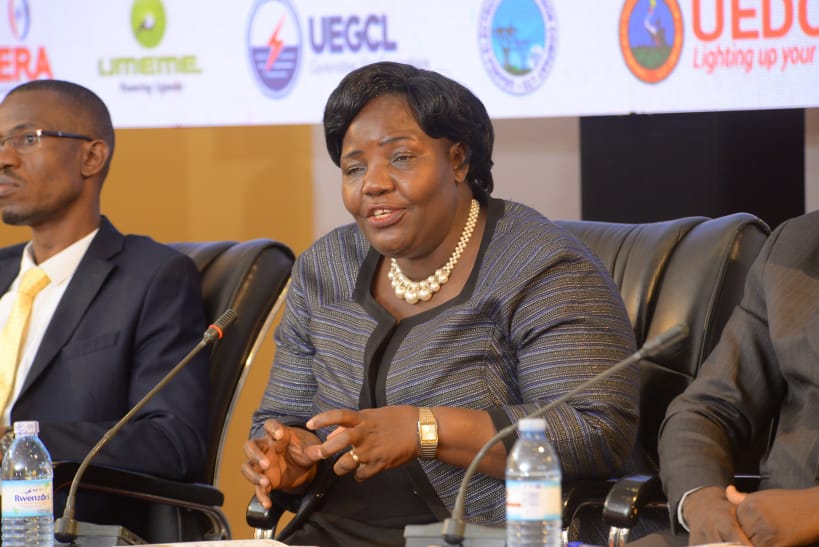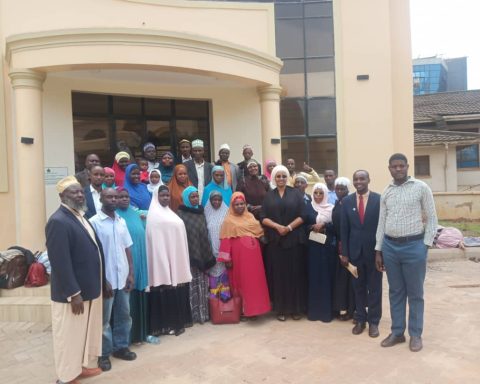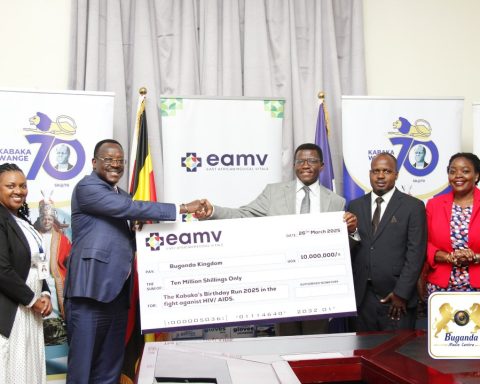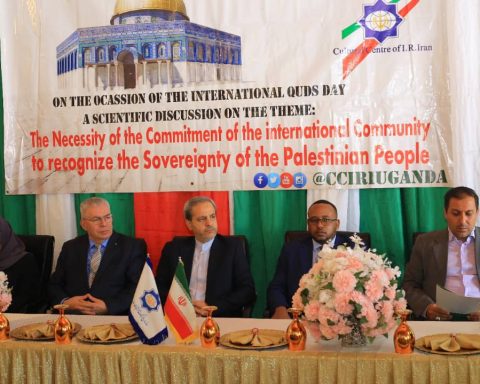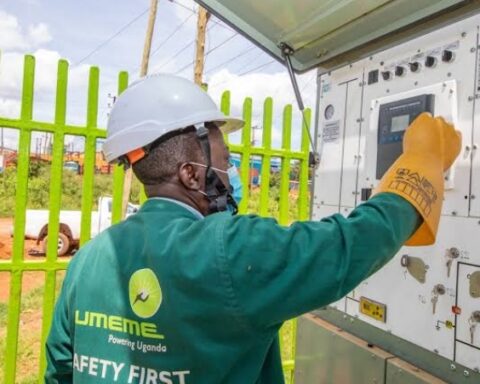The Chief Executive Officer of the Electricity Regulatory Authority (ERA), Engineer Ziria Tibalwa Waako, has said that the Authority is currently working on a framework for private investment into power transmission and renewable energy, in a bid to operationalize the Electricity (Amendment) Act, 2022.
Engineer Waako made the remarks while delivering her speech during the Renewable Energy Conference on Thursday November 3, 2022 at Speke Resort, Munyonyo.
Speaking about the Electricity Act (Amended) 2022, Waako clarified on the Policy Level, noting that the Ministry of Energy and Mineral Development (MOEMD) is now the majority shareholder of Government Power Generating Companies which include; Uganda Electricity Generation Company Limited (UEGCL), Uganda Electricity Transmission Company Limited (UETCL) and Uganda Electricity Distribution Company Limited (UEDCL).
“The majority and sole shareholder was the Ministry of Finance, so, the ownership resided in a different ministry and the monitoring, evaluation and enforcement of performance was residing in another ministry. However, with this amendment, the MOEMD can, at short notice, summon any Board of these utilities to check performance, to give directives, to ensure that the consumer who pays their cheque is able to obtain value for money in a timely manner,” Waako said.
She added that “This is a big takeaway for the sector, but most importantly for the consumer, and we hope this is going to improve efficiency and effectiveness within the electricity supply industry.”
She also noted that effective this month, the Ministry of Energy has been interfacing with the Boards of these companies in a bid to direct on performance.
She added that the amendment comes with an establishment of a dedicated department within the MOEMD in charge of planning, across the entire value chain.
“Issues of uncoordinated implementation, planning, delivery of services; where you have generation plants commissioned without evacuation lines, where you have transmission facilities commissioned without outgoing feeders at the distribution levels to be able to reach the last man, those are going to be history,” Waako asserted.
She said this department, supported by other sector players, will also be effective because it has been provided for within the Electricity Infrastructure Fund.
“The government on an annual basis will be providing resources. We operate a live network. It is very important that costly concessions, and rapid response is maintained. It is not possible for a utility to be notified that the transformer is down, and then you start planning, going to finance, then parliament, while the consumers are off supply. We hope that through this fund, we would be able to critic the responsiveness and efficiency of the private player and this goes a long way to prepare the sector for transition and also to improve the operations of the electricity supply industry,” she explained.
About increment of revenue, resourcing of the Electricity Regulatory Authority (ERA), she urged stakeholders to focus on what is in it.
She said the regulator has already established a Customer Protection Center that is fully equipped with resources.
“If a customer has any residual complaint with a reference number which shows that he or she raised an issue with a utility, but they did not respond in line with the standard operating procedure we shall know, because we have quality of service standards and quality of supply standards. We have tried to sensitize the public and we shall continue to sensitize them to ensure that they are part of Monitoring and Evaluation (M&E), because we believe that you must know the service level that you are supposed to receive to be able to raise these complaints,” she explained.
The Workaholic CEO added that ERA has also established an Installation Permits Committee Coordination Centre to strengthen the supervision of licensed companies and extend services to consumers.
This Centre will also be the main interface between the Installations Permit Committee (IPC), the installation wire persons, and ERA as a regulator.
“For those who are not familiar with the terminologies, when you want to implement electrical installation within your premises, industry, commercial facility, you are supposed to utilize a ‘Power Kapo’. We baptized these people Power Kapo. These are qualified people who have gained practical experience are well-tested and authorized by the Authority to handle electrical installations at a certain level,” she revealed.
Waako explained that “We have those who can handle only domestic households of up to five bedrooms, those who are authorized to handle both domestic and three-phase industrial wiring, those who are authorized to handle three-phase industrial only and those who are authorized to work on to the grid. Some are caped at 33KV distribution and others are able to work even on the transmission network. Those are the ones you see as sub-contractors with main contractors implementing various projects across the value chain; generation, transmission and distribution. These are the front-end technicians and engineers who are in charge of installation, and ensuring safety of supply.”
Improved Enforcement in Performances of Activities of Utilities
About this, Eng. Waako explained that; “In the past we have been going through directives and regulations but when these are not supported by the primary law, when challenged in court, it is very difficult to win a case. However, this amendment brought in place stringent penalties to licensees as body corporate and also as persons running the company, because if you are the CEO of a licensee who fails to make a decision on a timely manner or who leads to loss, it is not only the responsibility of the company but also to persons that are given that specific responsibility.”
On Vandalism of Electrical Installations
Waako said that penalties are now in billions of shillings and imprisonment of up to 12 years, depending on the crime committed, but noted that Authority also considers recovery.
“Talking about vandalism, this is an area we have prioritized as a sector and we are working through the office of the Prime Minister, in addition to rapid response by security operatives, to ensure that we get a law enacted so that we regulate the scrap business. These materials are harvested and either taken or sold to be transformed into other businesses which are not regulated, monitored and controlled. We identified that gap and we are working through the OPM in addition to now a more primitive legal framework, to also ensure that we listen to the other side too and we put in place a legal framework that regulates their activities,” Waako said.
She further explained that they have broadened the area of Corporate Social Responsibility through recognizing the local communities that host the renewable energy plants.
“Before, loyalties were only applicable to hydro-power projects. But now with the amendment, we are almost at the final end of operationalizing that clause. The regulation is at consultation stage. All the renewable energy host-local-districts will be benefiting from loyalties. Again, that is another good thing that came out of this Amended Act. On one side, one can say that the consumers have to pay more for these royalties. But sometimes these vices we are struggling with like vandalism come about because the host community has no sense of ownership. You are generating the electrons and they are flying allover and the whole community is in a blackout yet when you talk about corporate social loyalties, there is nothing in it for them. But through this new policy we shall go a long way to buy the loyalty of the host communities so as to urge them to take care and safeguard the infrastructure, because they are also benefiting from it.”
On Opening up of Monopoly at the Transmission Segment
Eng. Waako said that they have been operating a single buyer model, meaning that all generators sell their generated energy to one buyer; the transmission company and system operator, who in turn sells down stream to all the distributors.
“That’s the mob we’ve been on for the last 22 years but with this Amendment, we are moving ahead with a modified single buyer. We are going to have regulated customers and de-regulated customers. We are going to have generators sell power directly to industries. We are going to have transmitters sell power directly to industries. Meaning, we are moving towards modernization of our electricity supply industry. Indirectly, we are going to detach the business of transmission and distribution grid management from the business of power trading and that is where all modernized electricity supply industries are. We are in the process of putting in place a regulation to operationalize that clause. The amendment is very clear that these regulations must ensure that there is no discrimination,” Eng. Waako said.
“We shall soon be moving around to consult and have inputs of the various parties including clusters of consumers as represented by the various consumer groups leaders, manufacturers, ministries, departments and agencies before the regulation becomes effective,” she added.
Uganda’s power sector regulator, Electricity Regulatory Authority (ERA), for a fourth consecutive time, came ahead of other regulators on the continent in this year’s African Development Bank’s Electricity Regulatory Index (ERI).
According to the draft report for 2022, ERA is again number one, but Waako said all this is because of the government’s and stakeholders’ support.
![]()

